U.S. Rep. Marjorie Taylor Greene said on Friday that she won’t run against Democratic Sen. Jon Ossoff of Georgia in next year’s midterm elections, easing concerns for some Republicans who think she’s too controversial to win.
In a long post on the social media platform X, Greene pushed back against Republican donors and consultants who think her campaign would drive away moderate Republicans and independents needed to beat Ossoff. Greene said she doesn’t want to be part of a Senate that “doesn’t work” and is full of lawmakers who she believes oppose Trump supporters and don’t want real change.
“If I’m going to fight for a team, it will only be a team willing to lay it all on the line to save this country,” she wrote.
Ossoff, who is serving his first term, won the seat by a narrow margin in a state that was once a Republican stronghold but has become more competitive. He is a main target for Republicans who want to grow their small Senate majority.
Popular Republican Governor Brian Kemp, who could have been a strong challenger, said Monday that he won’t run in 2026. His decision leaves the race for the Republican nomination wide open.
U.S. Rep. Buddy Carter, who represents Georgia’s coastal area, became the first major Republican to officially enter the race on Thursday.
Six other Republicans besides Greene have said they are thinking about running. These include two other U.S. House members, Mike Collins and Rich McCormick. Other possible candidates are Secretary of State Brad Raffensperger, Agriculture Commissioner Tyler Harper, Insurance Commissioner John King, and state Senator Greg Dolezal.

“I expect a competitive primary — Senate seats don’t come along that often,” said Eric Tanenblatt, a top Republican fundraiser and close ally of Kemp who has supported candidates other than Trump in presidential primaries.
Greene is well known across the country and raises a lot of money. But she has supported conspiracy theories and has had conflicts with members of her own party. On Thursday, she told reporters she has more than 11 million social media followers, saying people follow her because they know what she stands for.
Greene would have had strong support in a Republican primary, where many voters remain loyal to Trump. Her announcement came a day after she said she was thinking about running.
“I’m going to give it some thought, talk to my family. I’m honored to have so much support from the great people of Georgia. And I have options,” she said Thursday.
Greene was first elected to the House in 2020. She first planned to run in a competitive district in northern Atlanta’s suburbs but moved to the more conservative 14th District in Georgia’s northwest.
She continued to support conspiracy theories even after 11 House Republicans joined Democrats to take away her committee assignments in February 2021. Greene described people jailed after the January 6, 2021, Capitol riot as political prisoners and has tried to shift blame for the attack onto Democrats.
She was later accepted back into the Republican fold by Kevin McCarthy, who built a political relationship with her. But she kept clashing with both Republicans and Democrats. In 2023, the House Freedom Caucus removed her from the group.


